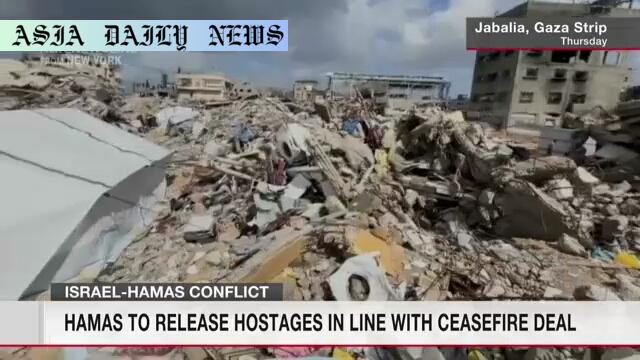Ceasefire: Hamas will release hostages on Saturday per agreement while Egyptian and Qatari mediators ensure aid continues into Gaza.
Hamas to release hostages on Saturday per ceasefire deal.
Mediators from Egypt and Qatar to oversee consistent aid into Gaza.
Delays due to accusations Israel disrupted relief supply flow.
Israeli spokesperson demands hostage release or ceasefire ends.

Hamas Agrees to Hostage Release Amid Ceasefire Agreement
The Islamic group Hamas has declared its intent to release hostages on Saturday in accordance with a ceasefire deal negotiated between Hamas and Israel. This announcement comes after prolonged discussions and mediation undertaken by Egypt and Qatar to manage ongoing tensions in Gaza and ensure aid supply to the region. Saturday’s release is poised as a critical moment in the fragile ceasefire agreement, which has seen delays in implementation.
The Role of Egypt and Qatar in Negotiations
The mediators, Egypt and Qatar, have been key in facilitating this humanitarian effort, committing to remove barriers to aid reaching Gaza. Their influence extends to overseeing the distribution of essential supplies such as food, water, mobile shelters, and materials to clear debris caused by ongoing conflicts. However, continued reports suggest inconsistencies in aid supplies due to tensions at crossings and infrastructure challenges within the territory.
Delay in Hostage Release Due to Accusations
Hamas had earlier postponed the release, accusing Israel of breaching the terms of the ceasefire agreement. According to Hamas, Israel failed to permit key relief supplies like mobile homes and heavy equipment to clear the extensive destruction caused by military strikes. Additionally, Hamas alleged that Israeli forces were pressuring residents inside the Gaza enclave, further aggravating the delicate situation.
Israel’s Response and Consequences
The Israeli government has issued a stern warning, stating that the ceasefire will collapse unless Hamas fulfills its promise to release three living hostages on Saturday. This ultimatum underscores the fragility of the situation and the interdependency of humanitarian supply lines and political agreements within this fraught standoff.
Humanitarian Challenges in Gaza
Gaza remains in dire straits, with displaced individuals facing harsh living conditions and destruction that has crippled infrastructure. Aid organizations have flagged the dire need for cold storage facilities, sanitary equipment, and housing solutions amidst rising temperatures and health concerns. Organizations operating in the region urge all parties to maintain ceasefire agreements to alleviate the region’s mounting humanitarian crisis.
Looking Ahead
Saturday’s anticipated release is a small yet pivotal step toward easing tensions between Hamas and Israel. However, the long-term resolution requires consistent efforts from all stakeholders, including sustainable delivery of humanitarian aid, transparent communication, and adherence to ceasefire terms. The international community’s attention on Gaza remains vital to counter escalating tensions and ensure the ceasefire holds.
Commentary
Understanding the Complexity of the Ceasefire
The announcement of a hostage release should be viewed not just as a momentary achievement in negotiations but as indicative of the intricate challenges present in the Israel-Hamas conflict. While a Saturday release provides some hope for affected families, it also reveals the fragility of agreements based on mutual distrust and ongoing humanitarian strife. Ceasefire agreements, although positive on paper, often necessitate immense international mediation and monitoring to translate into actionable outcomes.
The Role of Global Interventions
Egypt and Qatar’s active mediation exemplifies the importance of third-party involvement in resolving such fraught conflicts. However, simply facilitating discussions is not enough unless there is comprehensive follow-through regarding aid flows and ensuring agreements are honored. Aid blockades and allegations of unfair practices further complicate crises like this, making relief operations in challenging regions even harder. It raises the question of how aid can be ensured as impartial amidst such political and military sensitivities.
The Bigger Picture
Ultimately, Saturday could serve as a small but essential turning point. But as tensions flinch or ease, both Israel and Hamas must take responsibility for fostering pathways to long-term stability rather than temporary fixes. It is communities within Gaza and surrounding regions that bear the brunt of broken agreements and sporadic hostilities. While observers may view this as just another chapter in decades-long hostilities, the human toll reminds us of the stakes involved in ensuring lasting peace.


